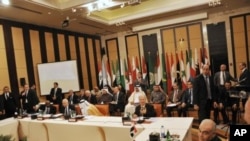The emir of Qatar's suggestion that an Arab military force be sent to stop the killing in Syria has been met with defiance and skepticism in Damascus, even as an Arab League mission meant to help end to violence appears to have had little effect.
Arab League monitor Jafaar Kubaida says the Qatari leader's proposal will be raised by the regional alliance in a special panel on Syria on Saturday [1/21/12], but that it is too early to tell where it will lead. "That's going to be discussed during the meeting with the Arab ministers. So it's just a suggestion from one party," he said.
Kubaida, who heads the Damascus monitoring team, has been part of a much-criticized effort to find a diplomatic solution to the crisis.
Human rights observers say the killings have continued during the mission, which began late last month, adding some 400 more civilian deaths to the U.N. estimate of more than 5,000 people killed in 10 months of anti-government protests.
Frustration with the ongoing crisis prompted Emir Sheikh Hamad bin Khalifa al-Thani to tell CBS television that Arab troops should be sent to stop the violence. He is the first Arab leader to propose military intervention.
His comments follow a warning by Arab League chief Nabil al Arabi that Syria is slipping dangerously close to civil war, as military defectors increasingly organize armed resistance.
But those who support Syrian President Bashar al-Assad, and those who say they do, dismiss the idea of an Arab military intervention as not needed.
Ennam Hassan is a young Damascus women of Palestinian heritage. She says that if the Qatari emir wants to send a mission somewhere, he should send it to her homeland.
Others put on a show of defiance.
Old City resident Abu el Kheir says, "The emir is like Israel in that both want to attack us." He dares them to "Give it a try."
El Kheir spoke in the presence of a government official escorting this reporter. But even in private conversations, the idea of an Arab military intervention in Syria is met with disbelief.
In a Damascus coffee house, a young man who says he is adamantly opposed to the Syrian government, says the emir's proposal is laughable. "What Arab force?" he asks. The only intra-Arab intervention, he says, was in the civil war in Lebanon, and that force was Syrian.
The logistics of mounting a regional mission could be daunting. Several Arab League members are dealing with the aftermath of uprisings of their own, while others are doing their best to suppress internal dissent or at least trying to keep it at bay.
They would not be alone in shying away from military force. The United Nations, whose chief on Sunday again condemned the violence, has been reluctant to move against Syria the way it did in Libya last year. Analysts point out that Damascus' allies are strong and complicated, bringing Russia, Iran and regional players like Hezbollah into the mix. With diplomatic efforts to end the violence in Syria seeming at an end, the promise of an outside military solution might be equally dim.
| Join the conversation on our social journalism site - Middle East Voices. Follow our Middle East reports on Twitter and discuss them on our Facebook page. |















